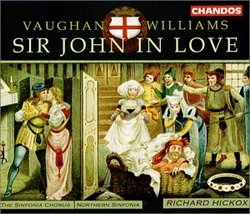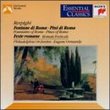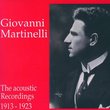| All Artists: Ralph Vaughan Williams, Richard Hickox, Anne-Marie Owens, Sarah Connolly, Northern Sinfonia and Chorus, Brian Bannatyne-Scott, Donald Maxwell, Roderick Williams, Susan Gritton, Matthew Best, Mark Padmore, Stephen Varcoe, Stephan Loges, John Bowen, Richard Lloyd-Morgan, Laura Claycomb, Henry Moss, Mark Richardson Title: Vaughan Williams - Sir John in Love / Hickox, Northern Sinfonia Members Wishing: 0 Total Copies: 0 Label: Chandos Release Date: 7/24/2001 Genre: Classical Styles: Opera & Classical Vocal, Historical Periods, Modern, 20th, & 21st Century Number of Discs: 2 SwapaCD Credits: 2 UPC: 095115992821 |
Search - Ralph Vaughan Williams, Richard Hickox, Anne-Marie Owens :: Vaughan Williams - Sir John in Love / Hickox, Northern Sinfonia
 | Ralph Vaughan Williams, Richard Hickox, Anne-Marie Owens Vaughan Williams - Sir John in Love / Hickox, Northern Sinfonia Genre: Classical
|
Larger Image |
CD DetailsSimilar CDs
|
CD ReviewsFive stars, but not the only choice. Ahmed E. Ismail | Cambridge, MA United States | 07/26/2001 (5 out of 5 stars) "Vaughan Williams's comic "Sir John in Love" is one of those true opera rarities--an opera whose highlights become more impressive as the music progresses. Indeed, the true highlight of this opera is its final "Windsor Forest" scene in Act IV, where all the action is resolved, and everyone gets their "just desserts."If this were the first recording of the opera available, it would be easy to recommend it to any VW (or opera!) enthusiast--the orchestral details are abundant and vividly present, the choral contribution is alive and infectious, and the vocal parts are well-presented and clear. However, there is in additional recording, in EMI's British Composer series, conducted by Meredith Davies. While many comparisons are stacked in the new version's favor, there are a few shortcomings that prevent an absolute recommendation.Where Hickox succeeds over Davies is particularly in the portrayal of Anne Page and her several suitors. Susan Gritton sings more effectively than Wendy Eathorne, while both Daniel Norman (Slender) and Adrian Thompson (Caius) seem more plausible as suitors than Bernard Dickerson and Gerald English, respectively--although overall English makes a more vivid Caius. However, there is no question that Mark Padmore is the better Fenton: as well as Robert Tear sings for Davies, I can't shake the impression that he is wooing an Amazon, and not the girl-next-door Anne.While the supporting cast is marginally to markedly superior for Hickox, with the Fords and Pages are fairly evenly matched between the two performances, the one clear victory of the Davies version is a significant one. As the title character, Donald Maxwell's Falstaff is no match for Raimund Herincx, either in characterization or in vocal quality. Additionally, the EMI set benefits from a superior recording--there's more of a sense of a performance in a real space, which adds an extra dimension to the rather static performance as presented by Hickox. Occasionally, Hickox also omits some dramatic effects (such as gasps from the onstage characters in Act III and laughter from the chorus in Act IV) which adds to the sense that this is only a "recording" and not a "performance."All in all, there is much to recommend the new version, but confronted with a choice between this set and the Davies set on EMI, personal taste will have to suffice in choosing between them. [You may want to sample them both before buying either.]" Sir John's love is more impressive the first time around Corno di Bass Trombono | Florida, U.S.A. | 08/04/2001 (3 out of 5 stars) "While I generally agree with the review of Ahmed Ismael, I must give the nod to the earlier EMI recording, which has greater depth and spread to the sound. Chandos engineers have practically placed the voices in our laps with a resultant loss of orchestral detail. The work is, of course, lovely but if the ear is fatigued by the sound the myriad beauties cannot make their full effect. If one adds to this the fact that the EMI is a midprice reissue the choice becomes even more clear. Bravo to Hickox and company but no standing ovation this time." Pros & Cons for both versions Klingsor Tristan | Suffolk | 08/30/2005 (4 out of 5 stars) "Boito took Shakespeare's Merry Wives, added a little Henry IV (e.g. the Honour Monologue) and shaped, moulded and cut them about to make a libretto that focused tightly on the Fat Knight and was absolutely perfect for what Verdi wanted. Out of it came one of the greatest of all comic operas.
With VW, you get something much closer to the Shakespearean original, teeming with richly drawn characters and all the variety of Elizabethan/Jacobean life bustling past. Falstaff is merely the primus inter pares among them, albeit a huge one. Out of it came a great comic opera. And one that has been too seldom performed, standing in the long shadow of its predecessor. Vaughan Williams, who was a great admirer of the Verdi piece, knew that comparisons would inevitably be made. (He would also have included his friend, Holst's, At the Boar's Head as a real rival from the Falstaff canon.) But comparisons are invidious. The VW and the Verdi operas are not comparable, either in their intentions or in their music. And both should be allowed to co-exist happily as companion pieces, not as rivals as two great comic operas we're fortunate to have. Perhaps I protest too much. But the Vaughan Williams is such invigorating, life-enhancing, often ravishingly beautiful stuff that I'd hate to see it slip off the end of the shelf. Verdi is lauded as the great tunesmith, but how many tunes from Falstaff can you recall - Nanetta's last act aria, perhaps, a couple of snippets of Fenton, the final fugue maybe, or Sir John's 'Quand'ero paggio' which is so brief an aria that its original singer had to record it three times in succession to fill a 78 side. Perhaps that's why Falstaff is so badly represented on 78's compared to the other mature Verdi operas. Great music, yes, but singalongaFalstaff had, in his mature operas, ceased to be the composer's intention. In Sir John in Love, on the other hand, the tunes just pour out one after the other. Which are genuine folksongs and which are VW originals is often hard to tell without a score in front of you (where the composer comes clean). Just listen to the way Dr. Caius' 'Vray Dieu d'Amour' takes over the orchestra or how 'Lovely Joan' (the tune in the trio of the famous Greensleeves Fantasia) heralds Mistress Quickly's arrival and 'Greensleeves' in situ is even lovelier than in the Fantasia. But then listen to the gorgeous tune that accompanies Ann Page's entrance, the wonderful melody for Ford's plea for forgiveness from his wife or the magical chorus that accompanies the arrival of the real bride and groom in the final scene. Those are all VW originals and great ones, to boot. Choosing between the two performances of the piece on disc, it's a question of swings and roundabouts. This Chandos recording with Hickox at the helm benefits from his direction - a bit tauter, a little more spring to the rhythms than Davies and the choral contributions are as polished as you'd expect from a seasoned choral specialist. The Chandos recording, too, is a bit more up to date in terms of sound, a bit fuller and richer. EMI, on the other hand, probably has the superior cast with the likes of Robert Tear, Felicity Palmer, Helen Watts and Robert Lloyd seeing off their Chandos counterparts. Honours between the two Falstaffs are more even. Neither is ideal in the part. Herincx has the 'fatter' voice: Maxwell on this recording is the more characterful. But a piece like the madrigal that Sir John sings before Ford/Brook's arrival needs more warmth and more steadiness than either of them provide (would Bryn ever consider it as a partner to his Verdi Falstaff?). It's a tough choice between the two versions. Choose the EMI for the cast (including, by a short head, Herincx's Flastaff). Choose this Chandos set for the conducting, the chorus and the more modern sound. " |

 Track Listings (16) - Disc #1
Track Listings (16) - Disc #1


